Our whole way of living is linked with sleep.

Research shows that one in every five people in Japan is concerned about the quality or amount of his or her sleep.
Regardless of the amount of sleep, modern people seem to feel a little uneasy about their sleeping habits.
Sleep is a physiological necessity for our survival,
but there are plenty of people who find that the more they worry
about their sleep patterns, the more difficult it is to get sleep.
So, what should we be doing so that we can sleep soundly?
According to Megumi Kaji of the Research Association of
Sleep and Society, interviewed on the next page,
the way that we spend our daytime creates our sleep.
And, she adds, “thinking about sleep means thinking about how you live. ”
Here we attempt to reveal some of the secrets of sleep,
so that you can feel secure and confident in enjoying
the process of exploring how to create your very own quality sleep.
Create your sleep.

From the moment you wake up,
youʼre defining the next nightʼs sleep.
When light streams in, your internal body clock resets and starts counting off a new day. Then, about 16 hours after rising in the morning, the internal clock will tell you itʼs time to get some sleep.
-
Wake up with a slightly hot shower
Are you the kind of person who still feels sleepy after dragging yourself out of bed? A warm shower can bring your body back to life. Get your blood flowing by letting the hot water flow onto your neck at the back and sides where the large blood vessels concentrate.
-
Save lie-ins for Saturdays
Stocking up sleep on weekends sounds like a good plan for beating a shortage of sleep, but it plays havoc with your body clock. If you want to wake up feeling refreshed on Monday, keep weekend lie-ins to Saturdays, and ideally get up within two hours later than your usual weekday time.
-
Plan your use of aromas
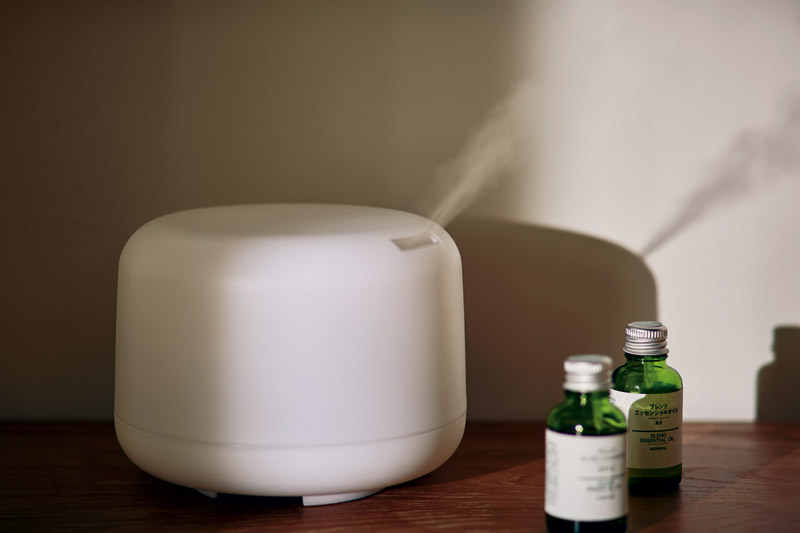
Using aromas is a great help for getting to sleep. Use different aromas in the morning and the evening to change the mood. Fresh, clean aromas like tea tree and grapefruit help you wake up, while calming aromas such as bergamot, sweet orange, and lavender are recommended for bedtime.
-
Familiar tunes
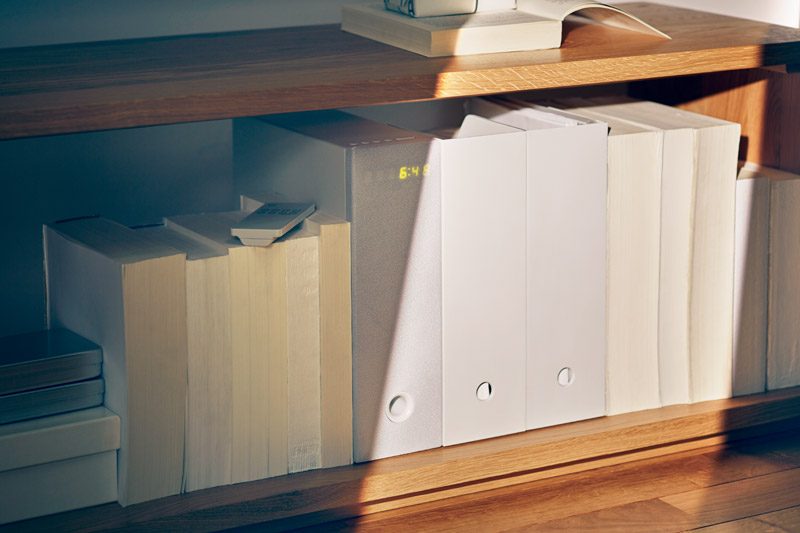
Sound and relaxation are closely connected. A good tempo helps you wake up. Before sleeping, tunes with no lyrics are recommended, but if youʼre familiar enough with a track, even comedy storytelling is fine. Keep the volume down, and youʼll soon be slumbering.
Your whole way of living is linked to how you will sleep.
How you spend the daytime determines how you sleep that night. That mechanism is like appetite for food. Exercising your body and brain during the daytime makes you hungry for sleep. Then, when night comes, youʼll soon be fast asleep.
-
Something to look forward to in the morning

How you wake up in the mornings is deeply connected to better sleep. Getting up and getting started straight away is the first step to good quality sleep. If you prepare a good breakfast, you will have something to look forward after getting up.
-
Light exercise in the early evening

Exercising to raise your body temperature during the day when it is at its highest is one way to make it easier to get to sleep. Even exercising at your desk is effective, such as stretching out your arms and legs. Cycling home is another option. How about taking a scenic route?
-
Split your evening meal

The ideal time for your evening meal is 3 hours before bed, but if other commitments make that difficult, try splitting the meal. Have a light meal at the ideal time to tell your body itʼs dinnertime, then follow that with something easy to digest after getting home.
-
15-minute nap
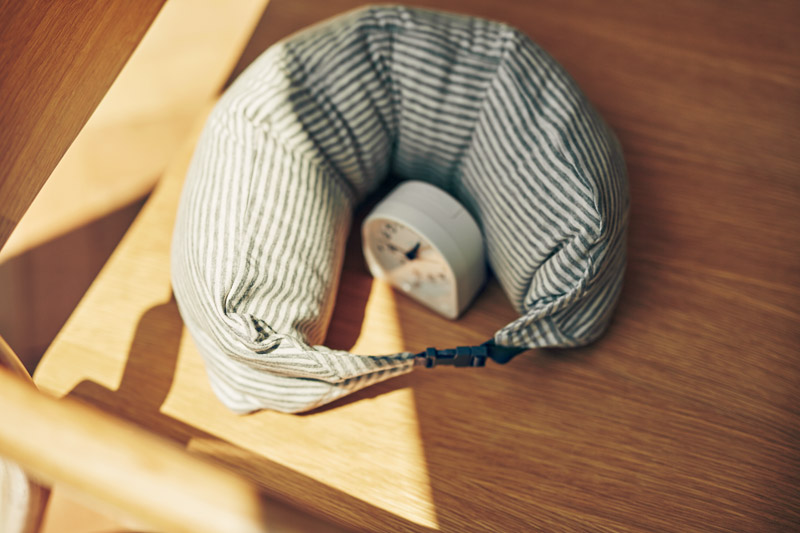
Your brain works is at its freshest just after you wake up. And feeling sleepy in the afternoon is part of our natural rhythm. Instead of lying down, take a 15-minute nap at your desk. And donʼt forget to set an alarm.
Prepare your body for sleep.
Sleep comes when your deep inner body temperature drops. The quickest way to achieve this is to warm your body first. If you take a bath in not-too-hot water to warm your body, your temperature will go down again, and youʼll soon be feeling sleepy, quite naturally
-
Read a difficult book
On days when itʼs difficult to fall asleep, try reading a difficult book. Youʼll soon find yourself becoming sleepy. Imported photobooks that transport you to another world, or a novel youʼve read many times before are recommended. Heavy books that tire your hands and arms are no good. Keep any books related to work closed.
-
Empty your brain

If possible, push your worries out of your mind before you go to sleep. Write down your worries to keep your mind tidy, and the act of writing means that you do not have to remember. Record todayʼs events, tomorrowʼs schedule and your anticipations to focus on getting a quality sleep.
-
Make the room steadily darker
If light hits your eyes before you go to sleep, that affects your body clock and makes going to sleep more difficult. Turn one light off after dining, then another after tidying up. Turn off any lights that come directly at your eyes, including smartphones and PC s.
-
Warm up gradually
Herb teas have long been known worldwide as a comforting beverage to drink before bed. Chamomile and lavender have aromas that help you relax. Breathe the vapor in slowly through the nose and mouth, and enjoy the comfortable feeling.
Hints for comfortable sleep.
Go to sleep after a hearty laugh at comedy storytelling or comics. Listen to music and relax more and more until you drift off to sleep. Take off your glasses, chat with your family, write a diary, read a difficult book... Everyone has different things that make them fall asleep.
-
Keep your feet and neck warm
If you wear thick socks, they will keep you warm in bed. The secret is to choose socks with a loose grip so that they donʼt constrict the blood flow. But bare feet will radiate heat better, so take off the socks before you go to bed. Having a piece of soft fabric around your neck will act as a seal between your body and the bedding, ensuring a warm sleep.
-
Sleeping in good air
To ensure a good sleep, keep watch over the temperature and humidity of your bedroom. In autumn and winter, set the air-conditioner to a temperature around 18-23 degrees, and turn on the humidifier. Use a circulator to keep the air flowing, without pointing the air stream directly at you. Aim to maintain healthy air at a temperature similar to that in your bed.
-
Pajamas are the best
Pajamas are specifically for sleeping. In a sense, theyʼre a uniform for sleeping. They have a pleasant touch, absorb moisture, and their shapes and a ll other characteristics are designed to be comfortable for sleeping in. Change into pajamas and your mood changes, hitting your bodyʼs sleep switch. No more constricting tee-shirts and training wear.
-
Donʼt turn the light on
If you wake up during the night and switch on a light, the brightness stimulates your eyes, and can make it difficult to get back to sleep. If you only need to go to the toilet, a gentle light illuminating your path is all thatʼs needed. An LED Portable Light will provide adequate illumination, without exposing you to bright lights.
Time to change beddings, too.
The secret to comfortable sleep lies in adjusting room temperature, body temperature, and humidity. Bedding maintains that environment while you sleep. Choose materials, touch, resilience, etc. according to the season, making bedtime all the more pleasant.
-
Spring

-
【Pillow】
Light feather material helps you wake up refreshed.
-
【Duvet】
A feather duvet is ideal up until the rainy season.
-
【Covers/sheets】
Switch to linen or cotton.
Adjust by layering beddings.─Spring is the season when creatures come out of hibernation and start to be very active. But the weather can be unstable, and there are still cold days. It is a good idea to change covers and sheets to linen or cotton for spring and
-
-
Summer
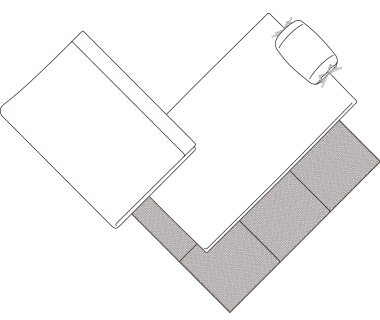
-
【Pillow】
A buckwheat pillow or a similar kind will keep your head cool.
-
【Duvet】
Using no blankets or duvets is not a good idea.Choose a towel blanket or a similar item to absorb the sweat and release the moisture.
-
【Covers/sheets】
If youʼre using a mattress, try using linen covers.
Find the coolest place in the house.─On hot nights when sleeping is difficult, leave the bed behind and use just an Igusa Unit Tatami. Using just a mattress on a cool floor is another idea. The towel blanket you use on top should be a good material that carries away moisture. Choose a toweling or gauze material blanket with an irregular or puckered woven surface.
-
-
Autumn
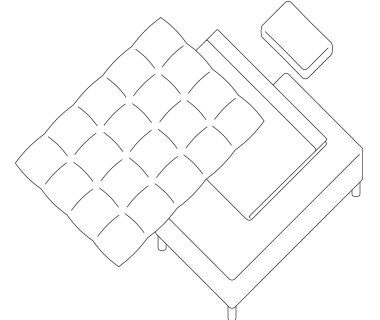
-
【Pillow】
A urethane foam low repulsion pillow has a soft feel that slowly lets you sink your head in.
-
【Duvet】
Same as in spring, use a one-layer light but warm feather duvet
-
【Covers/sheets】
Cotton naturally absorbs moisture.
Enjoy the delight of autumn clothes for your bed, too. ─For autumn nights, when it becomes slightly chilly, flannel items that feel instantly fluffy and warm are recommended. And for the long autumn nights, a Urethane Form Low Repulsion Quilt Pillow feels soft as it lets your head sink slowly in.
-
-
Winter
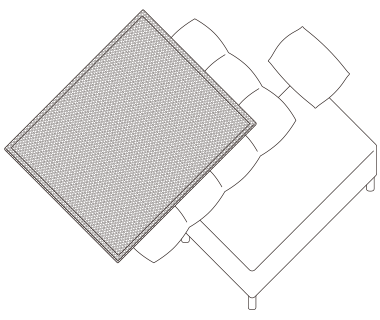
-
【Pillow】
A down mix pillow that includes air as it holds the head.
-
【Duvet】
A two-layer duvet containing large amounts of feathers to create a layer of warm air.
-
【Blanket】
Moss-stitch blanket that can contain a lot of air.
Layer of air is a warm friend─On cold days, use blankets and duvets on top of each other to create a layer of air. The material used for covers/sheets and the thickness of blankets are additional points to consider. Deep piles hold air, keeping the place you sleep warm all night long.
-
